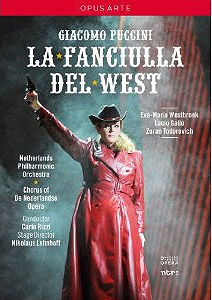“The American Way of Life, lightly satirized, lies at the heart of our production: it is an adventure that takes place somewhere between Wall Street and Hollywood.”
Nikolaus Lehnhoff, as can be surmised from these liner notes, makes full use of stereotypically “American” imagery throughout his production of Puccini’s La fanciulla del West: Wall Street traders, menacing skyscrapers, Leo the MGM Lion, and more. It is unclear, however, what it all adds up to, since there is little overarching or specific meaning in this mishmash of Americana.
The opera opens with a video of frenzied traders on the chaotic floor of the NYSE. I assumed this meant his production would be a commentary on the financial crisis. Well, not so much, since Lehnhoff essentially sticks to telling the story of Fanciulla that we all know, more or less. The Polka, a leather bar with a gay bartender that inexplicably attracts only straight men, is dominated by projections of oppressive skyscrapers looming overhead.
Clearly Lehnhoff vaguely wants to convey something, like maybe that the “miners” are all under the yoke of the slick city-dwelling finance execs of Wells Fargo? This could explain the ragazzi‘s mechanical movements, which perhaps suggest that they are all cogs in a money-making machine. Lehnhoff, however, does little to develop this angle, and in this repertoire, where I prefer to feel rather than think, it just seems easier not to ask any questions.
The truth is, despite all the head-scratching his production may induce, Lehnhoff is a good director and essentially directs a good traditional production, dressed up in fun nonsense. The relationships between the three main characters are believably and clearly developed, and full of nice touches, such as Minnie’s awkward fidgeting after she rather forwardly asks Johnson what his “number” is.
httpv://www.youtube.com/watch?v=WqshFfVaSrk
And what of the singers? Eva-Maria Westbroek‘s lirico-spinto soprano suits Puccini’s music quite well with its glamorous, sensuous middle and vibrant top, which occasionally sounds strained. She does not have the crisp diction one would expect in such a conversational part, but she does have a very sharp and pointed sense of rhythm, which gives shape and definition to the important parlando passages.
A Minnie who is not afraid to mess up her hair, Westbroek throws herself into the poker scene of Act 2 with palpable desperation, delivering a taunting “Tre assi e un paio!” although she is clearly tiring and has to take an inordinate number of breaths in her final lines. Speaking of Act 2, why is innocent Minnie’s trailer, with walls upholstered in eye-popping cerise, made to look like a porn star’s dressing room? I know, I know, I said no more questions.
Lucio Gallo looks and acts well as Jack Rance, but sounds less so. His voice is worn and leathery, especially on top, and he does better when he does not have to force. The same can be said for Zoran Todorovich‘s wooden-voiced Dick. To his credit, he manages the high-lying passages of Act 2 well enough, but falls disappointingly flat in the climactic passages of Act 3. Conductor Carlo Rizzi delivers a tight, forward-moving performance, yet is sensitive to the singers and their needs.
I have to admit I have no clue what Lehnhoff’s final tableau is about. Minnie (who has transformed into a retro Hollywood glamazon) and Ramerrez (now in a tux) are standing atop an illuminated staircase in the middle of a scrap-pile of junked cars, with a projection of Leo the MGM Lion silently roaring in the background, as a giant $20 bill envelops the entire screen. I’m sure Lehnhoff could give a very long explanation on how this is some commentary on the American dream, but frankly it doesn’t really matter.
I ultimately found this production to be a whole lot of fun but not inane, paradoxically saved by the traditional aspects of Lehnhoff’s direction. I am not one to be offended on behalf of any composer, so all the regie window-dressing was at its best entertaining and at its worst puzzling. This DVD is definitely not for those who need to see Minnie riding in on a horse, but also not for someone looking for Lehnhoff at his most insightful. This Fanciulla is recommendable, however, for the excellent direction of the singers and committed, slightly-crazed Minnie of Eva-Maria Westbroek.
It should be noted that all the usual cuts are made and then some, including the cheating scene in Act 1. Also, the English subtitles range from absurd to nonsensical.



